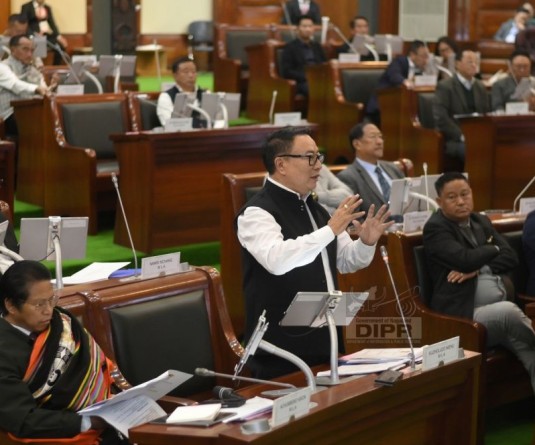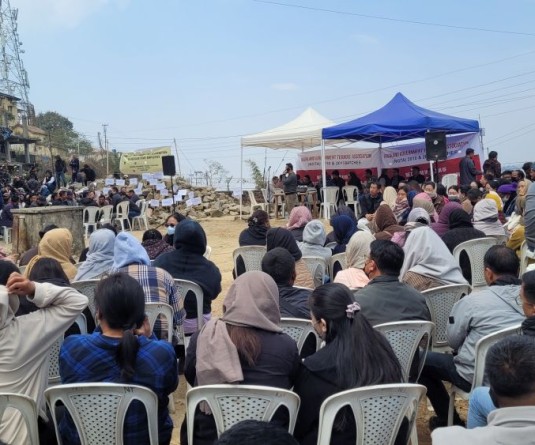
Parliamentary secretary for urban development lighting a candle as a mark inauguration of the state level workshop on Rajiv Awas Yojana in Kohima on January 14. (Morung Photo )
Kohima, January 14: Parliamentary secretary for urban development Zhaleo Rio today said the state government desire to declare Nagaland as slum-free state within three years time provided the projects submitted by the state government to GoI on Rajiv Awas Yojana (RAY) is sanctioned.
Addressing the state level workshop on RAY here at Hotel Cimorb organized by Regional Centre for Urban & Employment Studies (RCUES), Lucknow and Ministry of Housing & Urban Poverty Alleviation, the parliamentary secretary informed that the government is according highest priority on urban poor in the state. Rio said the urban development department had submitted few projects to GoI under RAY like housing for urban poor, working women hostel and rental house. However, so far not a single project has been sanctioned. He was hopeful that GoI will be generous to sanction the projects to the state.
Also stating that more towns be brought under RAY in Nagaland for which proposal for 17 towns has been submitted to GoI, he said the state also wanted to have satellite model township so that the people can do economic activities and generate employment. He also regretted that the state do not have proper city development plan and proper GIS mapping till date. Terming the workshop as beneficial, he hoped that the participants will go back wiser and more knowledgeable.
Earlier, Dr. Urmila Bagga, senior expert RCUES gave the overview of RAY, reforms and community participation & social audit under RAY while Dr. Toshimanen Ozukum, additional director MAC and Nodal Officer, RAY highlighted the status of RAY in Nagaland. Himanshu Chandra, assistant director RCCUES talked on slum survey, preparation of SFCPOA, GIS Mapping, preparation of DPR etc. The workshop was attended by participants from Kohima, Medziphema, Mokokchung, Tuensang, Longleng and other NGOs members.
RAY Slum free India
In pursuance vision of “Slum free India”, Rajiv Awas Yojana (RAY) was launched in June 2011 in two phases; the preparatory phase for a period of two years which ended in June 2013 and implementation phase. Central government has approved the implementation phase for the period of 2013-2022. RAY envisages two-step implementation strategy i.e. preparation of Slum free City Plan of Action (SFCPoA) and preparation of projects for selected slum. RAY envisages a “Slum Free India” with inclusive and equitable cities in which every citizen has access to basic civic infrastructure, social amenities and decent shelter.
Its mission is to encourage States/Union Territories (UTs) to tackle slums in a definitive manner, by focusing on bringing all existing slums, notified or non-notified (including recognised and identified) within the formal system and enabling them to avail the basic amenities that is available for the rest of the city/UA and redressing the failures of the formal system that lie behind the creation of slums by planning for affordable housing stock for the urban poor and initiating crucial policy changes required for facilitating the same.
The objective of RAY includes; improving and provisioning of housing, basic civic infrastructure and social amenities in intervened slums, enabling reforms to address some of the causes leading to creation of slums, facilitating a supportive environment for expanding institutional credit linkages for the urban poor, institutionalizing mechanisms for prevention of slums including creation of affordable housing stock, strengthening institutional and human resource capacities at the Municipal, City and state levels through comprehensive capacity building and strengthening of resource networks and empowering community by ensuring their participation at every stage of decision making through strengthening and nurturing Slum Dwellers’ Association/Federations.
In pursuance vision of “Slum free India”, Rajiv Awas Yojana (RAY) was launched in June 2011 in two phases; the preparatory phase for a period of two years which ended in June 2013 and implementation phase. Central government has approved the implementation phase for the period of 2013-2022. RAY envisages two-step implementation strategy i.e. preparation of Slum free City Plan of Action (SFCPoA) and preparation of projects for selected slum. RAY envisages a “Slum Free India” with inclusive and equitable cities in which every citizen has access to basic civic infrastructure, social amenities and decent shelter.
Its mission is to encourage States/Union Territories (UTs) to tackle slums in a definitive manner, by focusing on bringing all existing slums, notified or non-notified (including recognised and identified) within the formal system and enabling them to avail the basic amenities that is available for the rest of the city/UA and redressing the failures of the formal system that lie behind the creation of slums by planning for affordable housing stock for the urban poor and initiating crucial policy changes required for facilitating the same.
The objective of RAY includes; improving and provisioning of housing, basic civic infrastructure and social amenities in intervened slums, enabling reforms to address some of the causes leading to creation of slums, facilitating a supportive environment for expanding institutional credit linkages for the urban poor, institutionalizing mechanisms for prevention of slums including creation of affordable housing stock, strengthening institutional and human resource capacities at the Municipal, City and state levels through comprehensive capacity building and strengthening of resource networks and empowering community by ensuring their participation at every stage of decision making through strengthening and nurturing Slum Dwellers’ Association/Federations.






